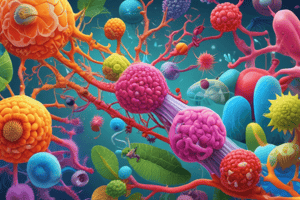Podcast
Questions and Answers
What is the main focus of cellular respiration?
What is the main focus of cellular respiration?
- Studying the inheritance of traits from parents to offspring
- Analyzing the interactions between organisms and the environment
- Investigating the physical structure of chromosomes
- Converting biochemical energy from food into usable energy (correct)
Who is known as the father of modern genetics?
Who is known as the father of modern genetics?
- Louis Pasteur
- Alfred Wallace
- Gregor Mendel (correct)
- Charles Darwin
What is the core concept that explains the diversity of life on Earth?
What is the core concept that explains the diversity of life on Earth?
- Ecology
- Cellular respiration
- Evolution (correct)
- Chromosomal basis of genetics
Which field of biology studies the interactions between organisms and their environment?
Which field of biology studies the interactions between organisms and their environment?
What process involves the study of the inheritance of traits from parents to offspring?
What process involves the study of the inheritance of traits from parents to offspring?
Which field of study focuses on understanding the structure, function, and development of the brain?
Which field of study focuses on understanding the structure, function, and development of the brain?
What is the primary focus of study in the field of microbiology?
What is the primary focus of study in the field of microbiology?
Which discipline involves understanding the mechanisms of infection and host response?
Which discipline involves understanding the mechanisms of infection and host response?
What is the primary subject matter of the field of genetics?
What is the primary subject matter of the field of genetics?
Which field of study is concerned with developing strategies for conserving biodiversity and restoring ecosystems?
Which field of study is concerned with developing strategies for conserving biodiversity and restoring ecosystems?
Which field of biology encompasses the study of all living organisms and their interactions with each other and the environment?
Which field of biology encompasses the study of all living organisms and their interactions with each other and the environment?
Flashcards are hidden until you start studying
Study Notes
Biology: The Study of Life
Biology is the scientific study of life and living organisms, including their structure, function, growth, reproduction, and evolution. It encompasses a wide range of disciplines, from molecular biology and genetics to ecology and conservation biology.
Cellular Respiration
One of the fundamental processes in biology is cellular respiration, which is the process by which cells convert biochemical energy from food into a form that can be used to fuel the cell's functions.
Mendelian Genetics
Mendelian genetics, also known as classical genetics, is the study of the inheritance of traits from parents to offspring. This branch of biology is named after Gregor Mendel, who is considered the father of modern genetics.
Chromosomal Basis of Genetics
The chromosomal basis of genetics is the study of the physical structure and behavior of chromosomes, which carry the genetic information in cells.
Evolution
Evolution is the process by which populations of organisms change over time due to the interaction of genetic variation, natural selection, and genetic drift. Evolution is a core concept in biology, and it explains the diversity of life on Earth.
Ecology
Ecology is the study of the interactions between organisms and their environment. This includes the relationships between species, as well as the interactions between organisms and their physical and biological surroundings.
Molecular Biology
Molecular biology is the study of the molecular basis of biological activity, including the structure and function of macromolecules like DNA, RNA, and proteins.
Neuroscience
Neuroscience is the study of the nervous system, including the structure, function, and development of the brain and other components of the nervous system.
Microbiology
Microbiology is the study of microorganisms, such as bacteria, viruses, fungi, and protozoa. It includes understanding their genetic material, their structure, their function, their life cycles, and their interactions with other organisms.
Infectious Disease
Infectious diseases are caused by pathogens, such as bacteria, viruses, fungi, and parasites. The study of infectious diseases involves understanding the mechanisms of infection, the host response to infection, and the development of treatments and vaccines.
Genetics
Genetics is the study of the physical and functional properties of genes, including their structure, replication, expression, and inheritance.
Zoology
Zoology is the study of animals, including their structure, ecology, behavior, and evolution.
Conservation Biology
Conservation biology is the study of how to protect and preserve species, ecosystems, and biodiversity. This includes understanding the threats to biodiversity, the impacts of human activities on the environment, and the development of strategies to conserve and restore ecosystems.
Other Topics
In addition to these major topics, there are many other areas of biology that are studied, including plant biology, molecular genetics, developmental biology, and more. Biology is a vast field with many subdisciplines, each with its own unique set of concepts and techniques.
In conclusion, biology is a diverse and interdisciplinary field that seeks to understand the natural world at various levels, from the molecular to the ecological. It encompasses a wide range of topics and subdisciplines, each contributing to our understanding of life and the world around us.
Studying That Suits You
Use AI to generate personalized quizzes and flashcards to suit your learning preferences.





